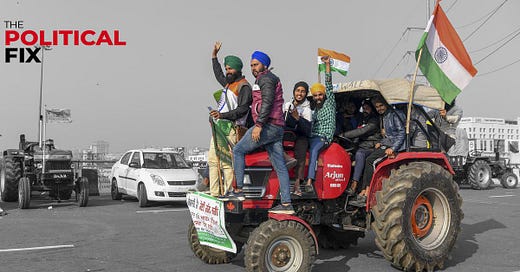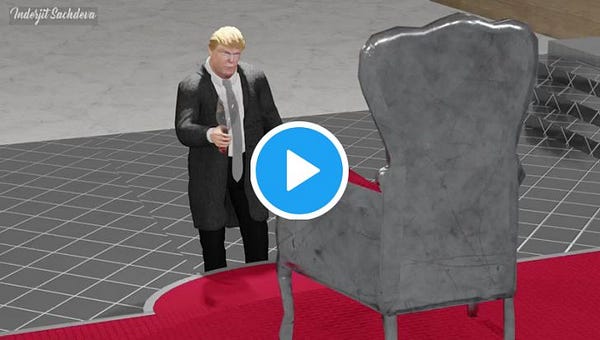The Political Fix: What BJP’s rejected offer to suspend farm laws tells us about Modi’s tactics
Plus, campaigning begins for state polls.
Welcome to The Political Fix by Rohan Venkataramakrishnan, a newsletter on Indian politics and policy. To get it in your inbox every week, sign up here.
We don’t charge for this newsletter, but if you would like to support us consider contributing to the Scroll Reporting Fund or, if you’re not in India, subscribing to Scroll+.
The Big Story: Zig-zag
If history is supposed to not repeat itself, but rhyme, this one is a bit of a slant.
As we’ve reminded you before, Prime Minister Narendra Modi began his first tenure in 2014 with a set of pro-business reforms to India’s land acquisition laws that drew the ire of rural India.
Having led his Bharatiya Janata Party to the first majority in Parliament in three decades, the assumption was that Modi had enough political capital to push through the new law, despite some pushback and accusations of being a “suit-boot ki sarkar” beholden to big business.
That assumption was wrong. After months of pressure, Modi caved, withdrawing the laws and – as many have observed – moving away from pro-business reforms to “new welfarism” to counter the narrative.
Over the last week, it appeared that Modi’s government was about to do something similar. Having spent much of 2020 comparing three new agricultural laws to an emancipation proclamation for India’s farmers, Union Minister Narendra Singh Tomar announced that the government was willing to suspend the laws for 12 to 18 months and set up a committee to examine the concerns of protesters who have been protesting on Delhi’s borders for nearly two months in the cold.
The offer, coming after the government had already promised to make a number of substantial amendments to the laws, represented a significant climb-down for Modi, less than two years after he was re-elected with a massive mandate.
The government had spent the previous 50 days pulling out all of its familiar weapons – ignoring protests and responding in nationalist language, labelling demonstrators terrorists and anti-national, attempting to drive a wedge between various farm unions and even banking on the Supreme Court to solve its problem.
That Modi had to offer to suspend laws that had been passed by Parliament didn’t just reflect the failure of these tactics. They also belied the BJP’s claims that the protests were limited to a small section of the farming community and ought to simply dissipate.
Not only have the protests lasted much longer than the government anticipated, they have grown in numbers – our reporters saw tractors lined up for 40 kilometres outside Delhi’s borders – and have been attracting participants from well beyond Punjab and Haryana.
“It is not good for the health of society for any agitation to run for too long,” said Suresh “Bhaiyyaji” Joshi, a senior leader of the Rashtriya Swayamsevak Sangh, the Hindutva organisation that is the BJP’s ideological parent. “We just want the agitation to end quickly now.”
Curiously, Tomar, the Union minister, even declared that “it will be a victory for Indian democracy the day farmers’ agitation ends”.
From this perspective, the government’s legally dubious offer to suspend the laws for 18 months seems more like damage control than clever tactic. Which may be why the farmer unions decided to say no.
“People have trust issues with the government. What if they implement these laws again after a stay for a short period?” said Rakesh Tikait, a farm union leader and one of the spokespersons of the Samyukta Kisan Morcha, the umbrella body of protesting farm groups. “After long deliberations, we came to this conclusion that we will not return till the laws are repealed. We can stay here for six more months, it hardly matters to us.”
The unions did consider the offer, since it was undoubtedly a major concession from the government relative to what had been on the plate so far. Reports suggest that a counter-proposal to suspend the laws for four or five years – until the next elections – was discussed, but ultimately these were all set aside, in part because there was no clarity on how laws passed by Parliament could be put on hold for a set timetable.
Another leader brought up the tactical question at hand: “These laws will be hanging like a sword… It will not be so easy to start another farmer movement such as this soon, so nothing less than repeal of these laws is acceptable to us.”
And so the deadlock is still in place. The government insists its offer to suspend the laws is final. The farm unions are demanding a full repeal.
After much discussion with the Delhi Police, farm groups have been given permission to enter the Capital on the outskirts on January 26 – Republic Day – for a tractor rally protest that will begin after the prime minister’s speech and annual military parade has ended. The government had earlier argued that allowing this would be a “huge embarrassment for the nation”. Uttar Pradesh has decided it will not supply any diesel to tractors through the week.
It is unclear what happens after. The protesters and the government, for the first time, have not set another date to meet. Ministers have gone back to talking about “invisible forces” derailing the talks.
There are some who believe that the farmers may have overplayed their hand, and won’t get any more from the government. Others expect the protests to swell, forcing the government to offer more concessions – just as it has over the past two months.
That the government even made the offer, however, leads to a few observations:
Unlike in the first term, Modi did not begin his legislative agenda in 2019 with this or other “development” policies. Instead, he went for more culturally contentious, long-standing Hindutva demands first – criminalising triple talaq, stripping autonomy from Jammu and Kashmir and passing discriminatory Citizenship Act amendments with a promise of a National Register of Citizens.
The “offer to suspend” may be formally new as a tactic, but informally it has also been applied to the last of those culturally sensitive efforts: the CAA and the NRC. Widespread protests against these around the country prompted Modi to falsely claim that his government had not even contemplated a National Register of Citizens, while the Citizenship Act amendments have not been implemented despite having been passed a year ago. In effect, for two winters in a row, protesters have managed to force the government to suspend legislation.
In the first term, the reason given for caving on the land acquisition law was that the BJP was still a minority in the Rajya Sabha. So the party put efforts into better managing Parliament, somehow passing the farm laws without even counting all the votes.
Yet, as in the case of CAA, the party has learnt that managing Parliament isn’t the same as creating public consensus. In fact, the BJP’s conscious decision to turn Parliament into little more than a rubber stamp has driven political contestation to the streets. Political scientist Neelanjan Sircar argues that the same is true for elections – funding has become so opaque and corporate, that even elections are no longer sufficient sites for political contestation.
Tomar almost seemed to acknowledge this when he said that the end of the protest would be a “victory for Indian democracy”. As many supporters of the government’s reform agenda fear, giving in to the farm union demands will only embolden other players to take to the streets and repeat these tactics. Of course, few groups have the wherewithal of the farm unions, but reports suggest the protests have already prompted the government to be cautious about its new labout code despite industry concerns.
Modi’s entire narrative project is built on the assumption that he alone represents the public’s interests. This is the reasoning given for running roughshod over Parliamentary procedures, and why any opposition to Modi is immediately depicted as either corrupt or anti-national. The government has been unable to do this with the farmers. Or at least it has struggled to make that image stick.
And so despite the widespread belief – and not-so-reliable surveys – saying Modi remains extremely popular, it is the government that has had to give in to the farm unions so far. If it does indeed rollback the laws eventually, that will once again set the tone for how reformist the rest of Modi’s legislative agenda is likely to be.
Flotsam and Jetsam
India has been providing – or arranging the sale of – millions of Covid-19 vaccine doses to countries both in its neighbourhood and around the world, helping New Delhi build diplomatic ties even as it competes with China.
The Congress was supposed to have held internal elections for its new President by now. Instead, the party plans to wait until state elections in April-May and is now promising its own internal polls only by June.
The ninth round of military talks between India and China over the disputed territories in Eastern Ladakh which saw violent confrontations in 2020 began at 10 am on Sunday and went well into the night, with little in the way of progress reported so far.
In West Bengal, Chief Minister Mamata Banerjee refused to speak at an event to commemorate Subhas Chandra Bose’s 125th birth anniversary after pro-BJP members of the crowd chanted religious slogans when it was her turn to address them.
Campaigning also began in Assam, with visits by Modi and Home Minister Amit Shah, and Tamil Nadu, where Congress’ Rahul Gandhi also turned up. Elections in West Bengal, Assam, Tamil Nadu, Kerala and Puducherry are due by April-May.
Can’t make this up
Please watch this, with sound turned on:
Thanks for reading the Political Fix. We’ll be back on Friday with a Q&A. Send feedback to rohan@scroll.in and do forward or share the newsletter if you enjoy it!





